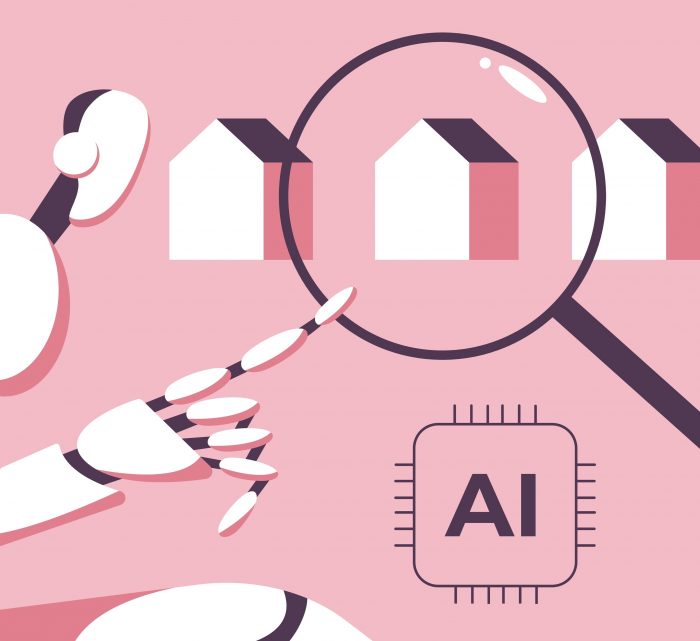How to use AI in real estate to automate tasks, analyze data, and improve client service. Learn practical tools agents are using.
Branding & Design Content Marketing Lead Generation
Artificial intelligence (AI) is changing how real estate professionals work. Top agents are using AI to analyze property data, automate routine tasks, and make faster, more informed decisions.
These tools are used in many different parts of the real estate industry, from helping buyers find the right home to predicting market trends. AI is also being integrated into property management, lead generation, and customer communication.
This article explains how AI is used in real estate today. It focuses on the tools, methods, and systems that experienced agents are already using to improve their business operations.
What Real Estate AI Is and Why It Matters
AI in real estate refers to computer programs that can process large amounts of data, recognize patterns, and make decisions based on that information. These programs help agents interpret market trends, automate repetitive tasks, and deliver personalized client experiences.
AI also allows agents to understand property values, forecast market shifts, and match buyers with suitable homes more efficiently.
According to the National Association of Realtors, about 17% of real estate agents now use AI tools in their weekly operations. This number is growing as these tools become more accessible and user-friendly.
Rather than replacing agents, AI supports them by handling data-heavy tasks. This allows agents to focus more on building relationships with clients and providing personalized advice.
Key AI Applications in Real Estate Industry
Let’s look at how real estate professionals are actually using AI in their businesses today.
Property Valuation and Market Forecasting
AI tools analyze property data to provide more accurate home valuations than traditional methods. These systems look at:
- Sales history: Recent sales of similar properties in the area
- Property features: Square footage, bedrooms, bathrooms, lot size
- Neighborhood data: School ratings, crime statistics, walkability scores
- Market trends: Price movements over time in specific areas
For example, an agent can input a property’s details into an AI valuation tool and receive an estimated value range based on current market conditions. This helps agents price listings more accurately and give buyers better advice about fair market value.
Top agents also use AI forecasting tools to predict how property values might change in the coming months. This gives them an edge when advising clients about the best time to buy or sell.
Automated Property Listings and Virtual Tours
AI writing tools can generate property descriptions that highlight key selling points. Instead of writing every listing description from scratch, agents can use AI to create a first draft that they then personalize.
Virtual staging tools use AI to digitally furnish empty rooms in listing photos. This helps buyers visualize the potential of a space without the expense of physical staging.

3D virtual tour technology uses AI to create interactive walkthroughs of properties. These tours allow buyers to explore homes remotely, saving time for both agents and clients.
Image enhancement tools automatically improve property photos by adjusting lighting, removing clutter, and highlighting architectural features. Better photos lead to more interest from potential buyers.
AI for Lead Generation and Personalization
AI tools help agents identify and connect with potential clients more effectively. These tools provide:
- Lead scoring: AI analyzes website visitor behavior to identify which leads are most likely to buy or sell soon.
- Personalized recommendations: AI matches properties to buyer preferences based on their search history.
- Automated follow-up: AI-powered systems send personalized messages to leads based on their interactions.
- Behavior prediction: AI identifies patterns that indicate when someone might be ready to enter the market.
For example, an AI system might notice that a lead has viewed the same property multiple times, searched for mortgage information, and looked at schools in the area. The system would flag this lead as high-priority for the agent to contact.
Practical Steps to Using AI in Real Estate Today
If you’re interested in using AI in your real estate business, here’s how to get started:
1. Identify Your Core Needs
Begin by looking at where AI could help you the most:
- Time-consuming tasks: Which repetitive tasks take up most of your day?
- Data challenges: Where do you need better insights or analysis?
- Client pain points: What parts of the buying or selling process frustrate your clients?
For example, if you spend hours writing listing descriptions, an AI writing tool might be your best first investment. If you struggle to price properties correctly, an AI valuation tool could help.
2. Research Relevant AI Tools
Once you know what you need, look for tools designed specifically for real estate.
For content creation and listing descriptions:
For lead generation and follow-up:
For property valuation:
For virtual tours and staging:
When comparing tools, consider:
- Ease of use
- Integration with your existing systems
- Cost versus potential time saved
- Training resources available
3. Start Small and Scale Up
Begin with one AI tool that addresses your most pressing need. This allows you to:
- Learn how AI works without feeling overwhelmed
- Measure the impact on your business before investing more
- Gain confidence with the technology
- Develop processes for integrating AI into your workflow
For example, you might start with an AI writing assistant to help with listing descriptions and social media posts. Once you’re comfortable with that, you could add a lead scoring tool or virtual staging software.
Set clear goals for what you want to achieve with each AI tool. This might be saving a specific amount of time, generating more leads, or improving your response rate to inquiries.
How AI Powers Real Estate Investment Decisions
Investors and agents who focus on investment properties are using AI to find opportunities and reduce risk.
AI analyzes data from multiple sources to identify properties with good investment potential. These sources include:
- Sales and rental history
- Neighborhood development plans
- Population growth trends
- Employment statistics
- School performance data
For example, an agent might use an AI platform to analyze hundreds of properties in a city and identify those with the best potential for rental income or appreciation. The AI considers factors that humans might miss or take weeks to research.
Rental yield prediction tools use AI to estimate how much income a property could generate. These tools factor in:
- Current rent prices in the area
- Vacancy rates
- Seasonal demand
- Property features that command premium rents
Risk assessment models help investors understand potential downsides. AI can flag issues like:
- Flood or natural disaster risk
- Neighborhood decline indicators
- Zoning changes that might affect value
- Market volatility in specific areas
Top agents use these insights to provide data-backed advice to investor clients, helping them make better decisions about which properties to buy.
Common Challenges and Solutions When Using AI
While AI offers many benefits, real estate professionals also face challenges when implementing these tools.
Data Privacy Concerns
AI systems collect and analyze large amounts of personal data. To address this, top agents:
- Work with AI providers that comply with data protection regulations
- Inform clients about how their data will be used
- Use secure systems with strong encryption
Learning Curve
New technology can be intimidating. Successful agents manage this by:
- Starting with user-friendly tools that offer good support
- Taking advantage of training resources and tutorials
- Focusing on one tool at a time rather than trying to learn everything at once
Cost Considerations
AI tools often require subscription fees. To ensure good return on investment, agents:
- Track time saved and additional business generated
- Start with free or low-cost options to test effectiveness
- Share costs across a team when possible
Maintaining the Human Touch
Real estate is a relationship business. To balance technology with personal connection, top agents:
- Use AI for behind-the-scenes tasks but handle important client interactions personally
- Review and personalize AI-generated content before sharing it
- Let clients know when they’re interacting with AI versus a human team member
Transforming Your Real Estate Business with AI
AI is changing how real estate works, but it’s not replacing the need for skilled agents. Instead, it’s giving agents new tools to work more efficiently and provide better service.
The most successful agents see AI as a partner that handles routine tasks while they focus on building relationships and sharing their unique market knowledge. They use AI to enhance their expertise, not replace it.
Starting with AI doesn’t have to be complicated. Many agents begin with simple tools like AI writing assistants for listing descriptions or social media content. As they become more comfortable, they add more advanced tools for lead generation, property valuation, or market analysis.
The key is to choose tools that solve real problems in your business. If you spend hours writing content, start with an AI writing assistant. If you struggle to follow up with leads consistently, look at automated communication tools.
Remember that AI works best when it’s integrated with your existing systems. Look for tools that connect with your CRM, website, and other platforms you already use.
AgentFire websites are designed to work seamlessly with many popular AI tools for real estate. This integration helps agents leverage AI while maintaining a consistent brand and client experience. To learn more about how AgentFire can help you incorporate AI into your real estate business, visit https://agentfire.com/schedule-a-demo/.
FAQs About AI in Real Estate
What are the best AI tools for real estate agents to start with?
Most agents find success starting with AI writing tools for content creation and chatbots for lead capture, as these provide immediate time savings with minimal setup.
How much does it cost to implement AI in a real estate business?
AI tools range from free options like basic ChatGPT to premium solutions costing $50-500 monthly, with many individual agents spending around $100-200 monthly for essential tools.
How can real estate agents use AI for content creation?
Agents use AI to generate property descriptions, blog posts about local market trends, social media content, and personalized email campaigns that maintain consistent messaging.
Will artificial intelligence replace real estate agents?
AI enhances agent capabilities by handling data analysis and routine tasks but cannot replace the human judgment, emotional intelligence, and negotiation skills that agents bring to transactions.
How do I choose the right AI solution for my real estate business?
Look for AI tools that address your specific pain points, integrate with your existing systems, and provide measurable benefits within your budget.

